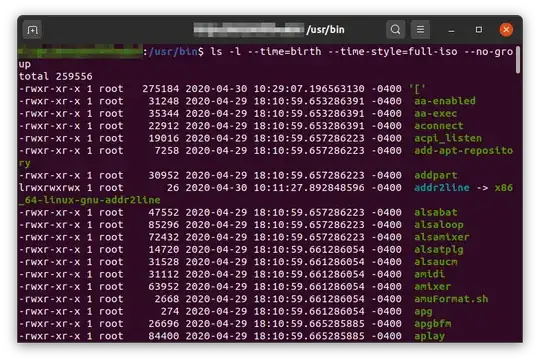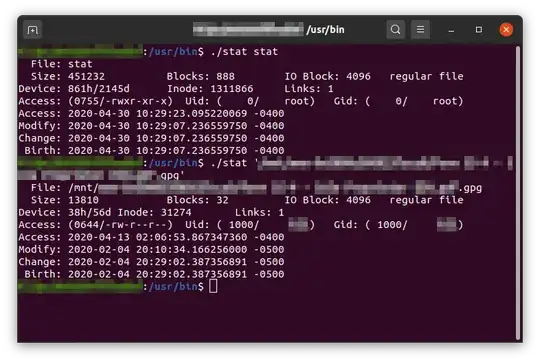The inability of stat to show the creation time is due to limitation of the stat(2) system call, whose return struct doesn't include a field for the creation time. Starting with Linux 4.11 (i.e., 17.10 and newer*), however, the new statx(2) system call is available, which does include a creation time in its return struct.
* And possibly on older LTS releases using the hardware enablement stack (HWE) kernels. Check uname -r to see if you are using a kernel at least at 4.11 to confirm.
Unfortunately, it's not easy to call system calls directly in a C program. Typically glibc provides a wrapper that makes the job easy, but glibc only added a wrapper for statx(2) in August 2018 (version 2.28, available in 18.10). The stat command itself gained support for statx(2) only in GNU coreutils 8.31 (released in March 2019), however, even Ubuntu 20.04 only has coreutils 8.30.
But I don't think this will be backported to LTS releases even if they do get, or are already on, newer kernels or glibcs. So, I don't expect stat on any current LTS release (16.04, 18.04 or 20.04) to ever print the creation time without manual intervention.
On 18.10 and newer, you can directly use the statx function as described in man 2 statx (note that the 18.10 manpage is incorrect in stating that glibc hasn't added the wrapper yet).
And in Ubuntu 20.10, you will be able to use stat directly:
# stat --version
stat (GNU coreutils) 8.32
Copyright (C) 2020 Free Software Foundation, Inc.
License GPLv3+: GNU GPL version 3 or later <https://gnu.org/licenses/gpl.html>.
This is free software: you are free to change and redistribute it.
There is NO WARRANTY, to the extent permitted by law.
Written by Michael Meskes.
stat /
File: /
Size: 4096 Blocks: 8 IO Block: 4096 directory
Device: 88h/136d Inode: 57279593 Links: 1
Access: (0755/drwxr-xr-x) Uid: ( 0/ root) Gid: ( 0/ root)
Access: 2020-08-18 06:57:46.912243164 +0000
Modify: 2020-08-18 06:57:06.768492334 +0000
Change: 2020-08-18 06:57:59.136165661 +0000
Birth: 2020-08-18 06:57:06.768492334 +0000
For older systems, luckily, @whotwagner wrote a sample C program that shows how to use the statx(2) system call on x86 and x86-64 systems. Its output is the same format as stat's default, without any formatting options, but it's simple to modify it to print just the birth time.
First, clone it:
git clone https://github.com/whotwagner/statx-fun
You can compile the statx.c code, or, if you just want the birth time, create a birth.c in the cloned directory with the following code (which is a minimal version of statx.c printing just the creation timestamp including nanosecond precision):
#define _GNU_SOURCE
#define _ATFILE_SOURCE
#include <stdio.h>
#include <stdlib.h>
#include <sys/types.h>
#include <unistd.h>
#include <fcntl.h>
#include "statx.h"
#include <time.h>
#include <getopt.h>
#include <string.h>
// does not (yet) provide a wrapper for the statx() system call
#include <sys/syscall.h>
/* this code works ony with x86 and x86_64 */
#if x86_64
#define __NR_statx 332
#else
#define __NR_statx 383
#endif
#define statx(a,b,c,d,e) syscall(__NR_statx,(a),(b),(c),(d),(e))
int main(int argc, char *argv[])
{
int dirfd = AT_FDCWD;
int flags = AT_SYMLINK_NOFOLLOW;
unsigned int mask = STATX_ALL;
struct statx stxbuf;
long ret = 0;
int opt = 0;
while(( opt = getopt(argc, argv, "alfd")) != -1)
{
switch(opt) {
case 'a':
flags |= AT_NO_AUTOMOUNT;
break;
case 'l':
flags &= ~AT_SYMLINK_NOFOLLOW;
break;
case 'f':
flags &= ~AT_STATX_SYNC_TYPE;
flags |= AT_STATX_FORCE_SYNC;
break;
case 'd':
flags &= ~AT_STATX_SYNC_TYPE;
flags |= AT_STATX_DONT_SYNC;
break;
default:
exit(EXIT_SUCCESS);
break;
}
}
if (optind >= argc) {
exit(EXIT_FAILURE);
}
for (; optind < argc; optind++) {
memset(&stxbuf, 0xbf, sizeof(stxbuf));
ret = statx(dirfd, argv[optind], flags, mask, &stxbuf);
if( ret < 0)
{
perror("statx");
return EXIT_FAILURE;
}
printf("%lld.%u\n", *&stxbuf.stx_btime.tv_sec, *&stxbuf.stx_btime.tv_nsec);
}
return EXIT_SUCCESS;
}
Then:
$ make birth
$ ./birth ./birth.c
1511793291.254337149
$ ./birth ./birth.c | xargs -I {} date -d @{}
Mon Nov 27 14:34:51 UTC 2017
In theory this should make the creation time more accessible:
- more filesystems should be supported than just the ext* ones (
debugfs is a tool for ext2/3/4 filesystems, and unusable on others)
- you don't need root to use this (except for installing some required packages, like
make and linux-libc-dev).
Testing out an xfs system, for example:
$ truncate -s 1G temp; mkfs -t xfs temp; mkdir foo; sudo mount temp foo; sudo chown $USER foo
$ touch foo/bar
$ # some time later
$ echo > foo/bar
$ chmod og-w foo/bar
$ ./birth foo/bar | xargs -I {} date -d @{}
Mon Nov 27 14:43:21 UTC 2017
$ stat foo/bar
File: foo/bar
Size: 1 Blocks: 8 IO Block: 4096 regular file
Device: 700h/1792d Inode: 99 Links: 1
Access: (0644/-rw-r--r--) Uid: ( 1000/ muru) Gid: ( 1000/ muru)
Access: 2017-11-27 14:43:32.845579010 +0000
Modify: 2017-11-27 14:44:38.809696644 +0000
Change: 2017-11-27 14:44:45.536112317 +0000
Birth: -
However, this didn't work for NTFS and exfat. I guess the FUSE filesystems for those didn't include the creation time.

